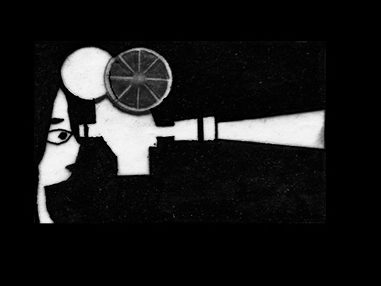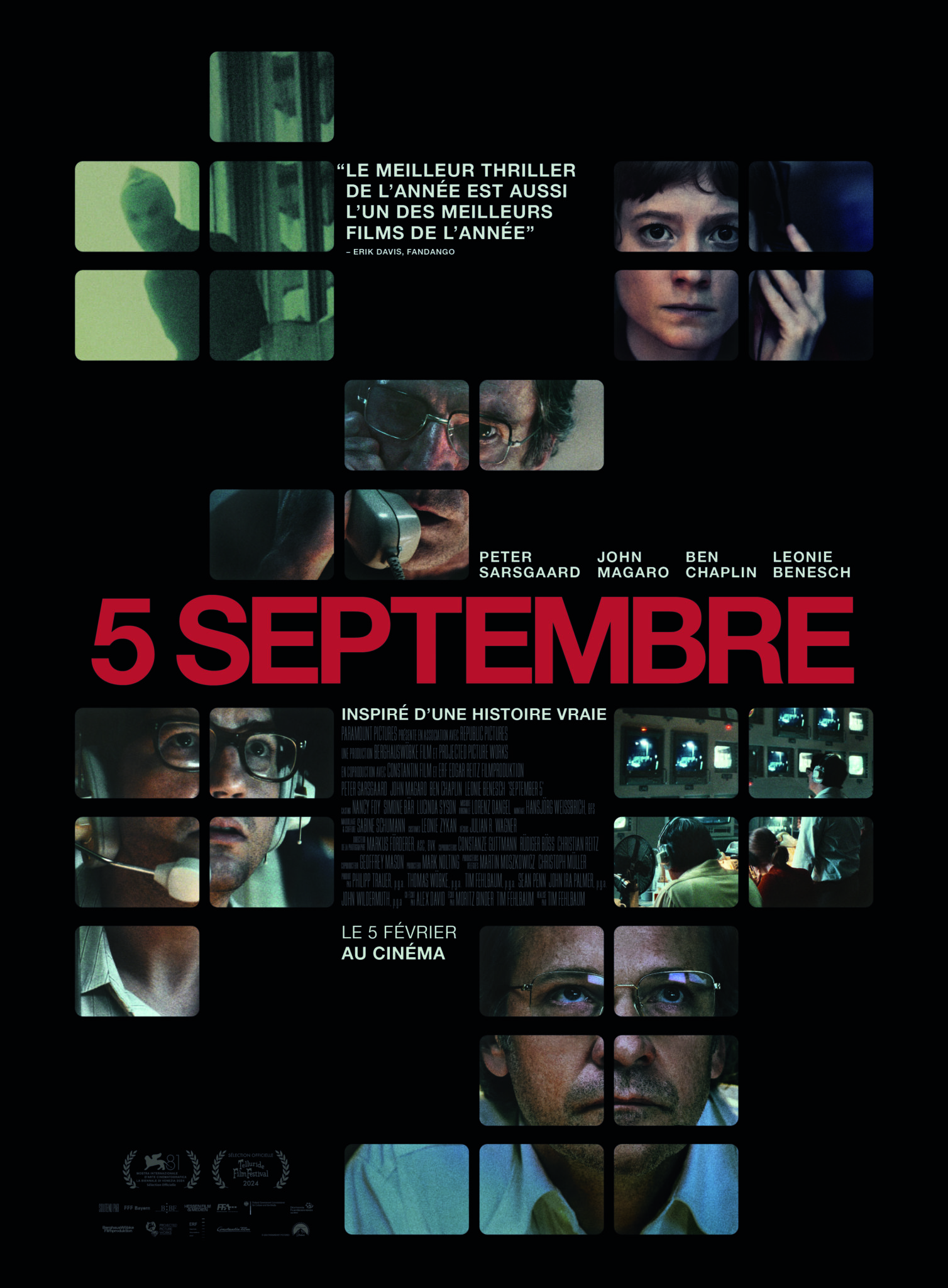“September 5th,” directed by Tim Fehlbaum, nominated in Best screenplat at the 2025 Academy Awards –
In theaters on February 5.
Synopsis of “September 5th”
September 5th takes us back to an event that forever changed the world of media and continues to resonate today, in an era where live broadcasting and media control remain subjects of intense debate.
The film is set during the 1972 Munich Olympics, where the American television team is forced to abruptly interrupt their coverage of the competitions to broadcast the live hostage crisis involving Israeli athletes. At the time, this event was followed by approximately one billion people worldwide.
At the heart of the story is Geoff (John Magaro), an ambitious young producer determined to prove himself to his boss, the legendary television director Roone Arledge (Peter Sarsgaard).
Alongside his German interpreter colleague Marianne (Leonie Benesch) and his mentor Marvin Bader (Ben Chaplin), Geoff finds himself facing the moral and ethical dilemmas of continuous news coverage.
“September 5th” – “October 7th”
Sometimes, history stutters—tragically.
September 5th, directed by Tim Fehlbaum, chillingly echoes the October 7 pogrom.
The film retraces the attack orchestrated by the terrorist group Black September, in which eight Palestinian terrorists murdered two Israeli athletes and took eight others hostage. This occurred as Germany sought to rehabilitate its international image. The entire world watched the crisis unfold live, marking the birth of the 24-hour news cycle.
Fehlbaum highlights the complexity of live broadcasting during that era: no digital technology, the urgency of developing film reels, and fierce competition between TV networks. He exposes the intense pressure faced by journalists like Geoff, grappling with ethical questions: Should everything be shown, no matter the cost?
A historic turning point
Global media covered the event relentlessly. The American network ABC, led by Roone Arledge (an outstanding Peter Sarsgaard), was on high alert. This was the first time the Olympics were held in Germany since World War II, with round-the-clock media coverage.
In Arledge’s team, his deputy Marvin Bader (brilliantly portrayed by Ben Chaplin) embodies a Jewish character whose family perished in the Holocaust. The spotlight also turns to the Israeli athletes, questioned about competing in Germany, a country historically responsible for the Shoah. The athletes, driven by hope, came for the spirit of sportsmanship and the Olympic ideal.
But during the second week of the Summer Olympics, at 4:30 AM, gunshots rang out.
Shortly after, it was confirmed: Palestinians had killed two Israelis and taken eight others hostage, with one managing to escape. The terrorist group demanded the release and safe passage to Egypt of 234 Palestinian militants held in Israeli prisons, as well as two members of the Red Army Faction (RAF), Andreas Baader and Ulrike Meinhof, imprisoned in Germany.
Global indifference in the face of horror
Just a few meters away, the Olympic Games continued as if nothing had happened.
On September 6th, a memorial ceremony was held where the President of the International Olympic Committee, Avery Brundage—suspected of antisemitism since the 1930s—gave a speech praising the resilience of the Olympic movement, without mentioning the murdered athletes, and declared that “the Games must go on.”
The Games resumed. Most of the 80,000 spectators attending the football match between West Germany and Hungary acted as if nothing had occurred the day before.
When a banner reading “17 Dead, Already Forgotten?” appeared, security forces quickly confiscated it and expelled the spectators who displayed it.
Once again, horror unfolded on German soil, while life carried on just steps away. One cannot help but think of Auschwitz, where Poles and Germans continued their daily lives alongside the gas chambers.
An immersive direction: chaos in real-time
Young producer Geoff (great John Magaro), at the heart of ABC’s control room, decides to continue broadcasting live coverage of the attack, no matter the cost.
This was a first in media history. Roone Arledge fought against network executives who wanted to revert to regular news programming. By negotiating with NBC, he managed to keep ABC on the air.
Eventually, the Olympics were halted, and the athletes evacuated.
Three crew members—a cameraman, sound operator, and director of photography—were sent directly opposite the building where the Israeli hostages were held, covering the event live. Every second, ABC’s team fought to keep viewers informed, with crucial support from German interpreter Marianne (superbly played by Leonie Benesch), who translated police communications from radio transmissions.
More than just a human story—A political one
Filmed using a 360° platform for an immersive experience, the audience is plunged into this race against time to keep broadcasting the hostage crisis live, alongside the potential German intervention to rescue the Israeli athletes.
Tim Fehlbaum worked closely with Geoff Mason, one of ABC’s original producers during the 1972 crisis, to ensure historical accuracy in the live coverage depicted. Authentic 1970s equipment was used to recreate the newsroom environment.
Over one billion viewers watched the terrorist attacks unfold live, witnessing the successive failures of the German rescue attempts.
Fehlbaum also highlights the technical challenges of live reporting at the time—shooting on film meant reels had to be developed quickly—and the early days of fierce competition in news media.
A gripping, terrifying masterpiece that leaves audiences shaken by the strength of its message and its relevance to current events.
A film echoing persistent antisemitism?
Jews have been targeted throughout history, and Israelis have faced attacks since the establishment of the State of Israel.
Germany’s failure to protect the Israeli athletes is a lasting stain on its history. This tragedy also marked a turning point for Israel.
The event triggered Israeli reprisals worldwide, masterfully depicted in Steven Spielberg’s “Munich”.
Golda Meir, then Prime Minister of Israel, vowed never to entrust the fate of Jews to other nations again. This led to Israel’s military intervention during another hostage crisis in Entebbe in 1976, where commandos rescued nearly all the hostages from a hijacked plane—except Yonatan Netanyahu, the brother of Israel’s current Prime Minister, Benjamin Netanyahu, who died during the operation.
From that point forward, Israel committed to intervening globally to protect its people.
Media coverage of hostage crises
The October 7 attacks received little sympathy or empathy from global media and international communities.
No flags at half-mast, despite the massacre of 1,200 civilians in their homes—elderly, men, women, children, and infants.
On the contrary, it reignited global antisemitism, which has continued to spread, fueled by so-called “useful idiots,” as Michaël Prazan aptly describes in his book “La vérité sur le Hamas et ses idiots utiles.
Trailer “September 5th” in all good theaters on February 5th.
10 Israeli films & series to watch


